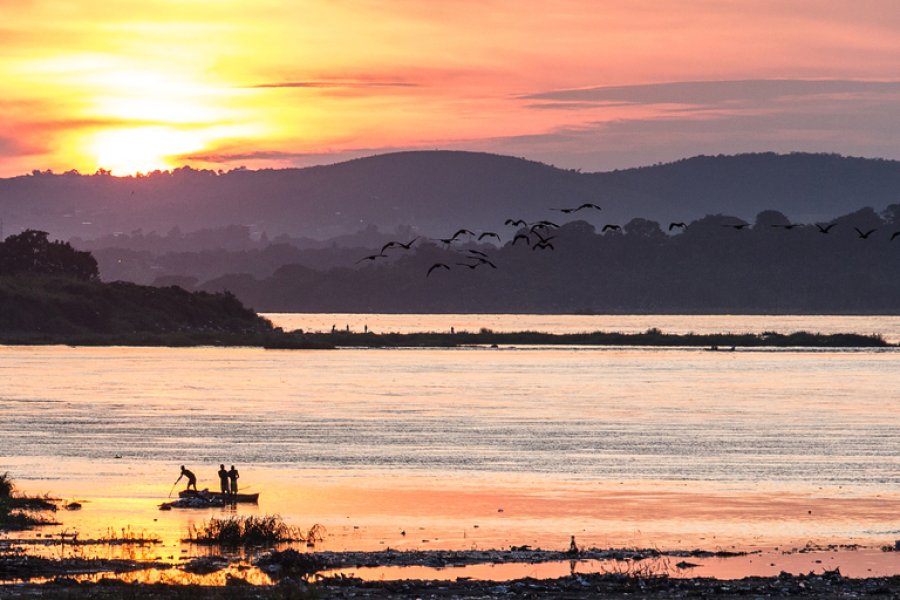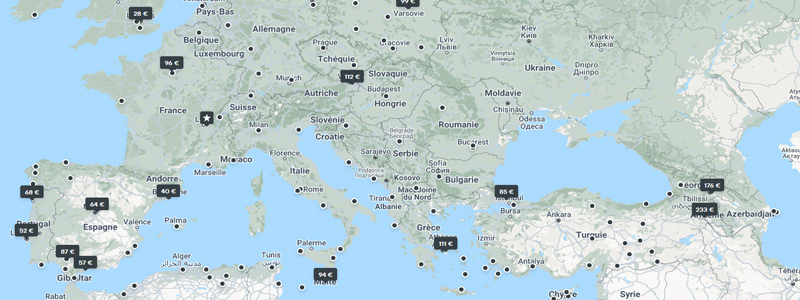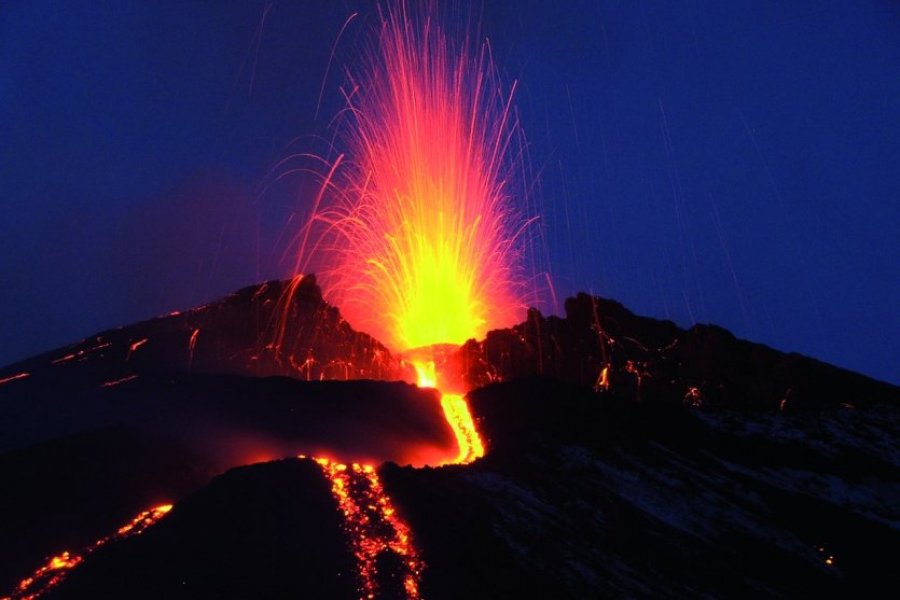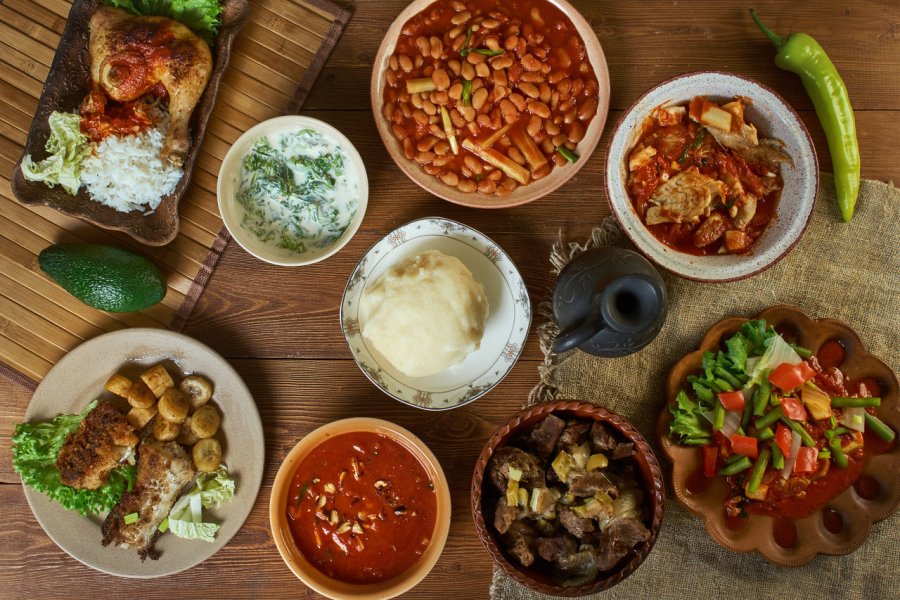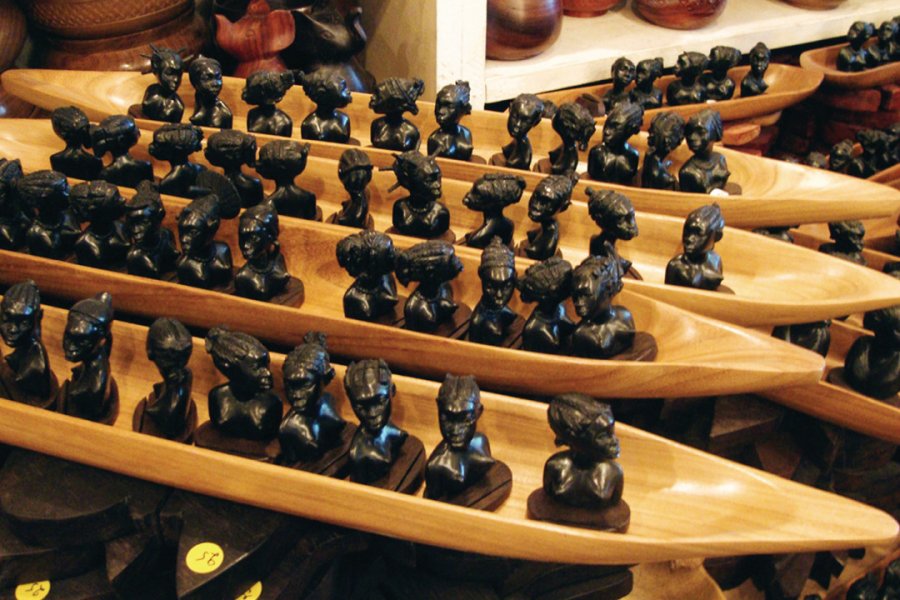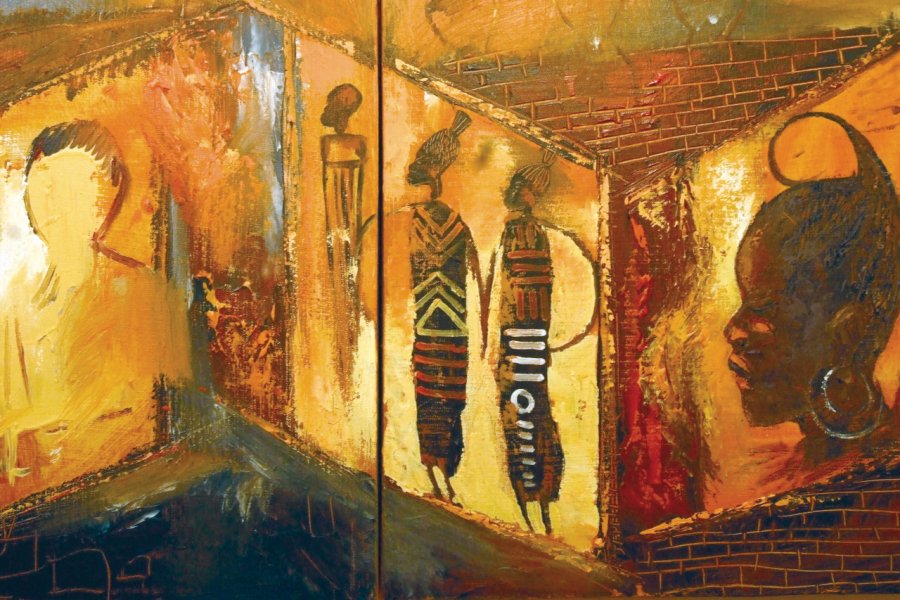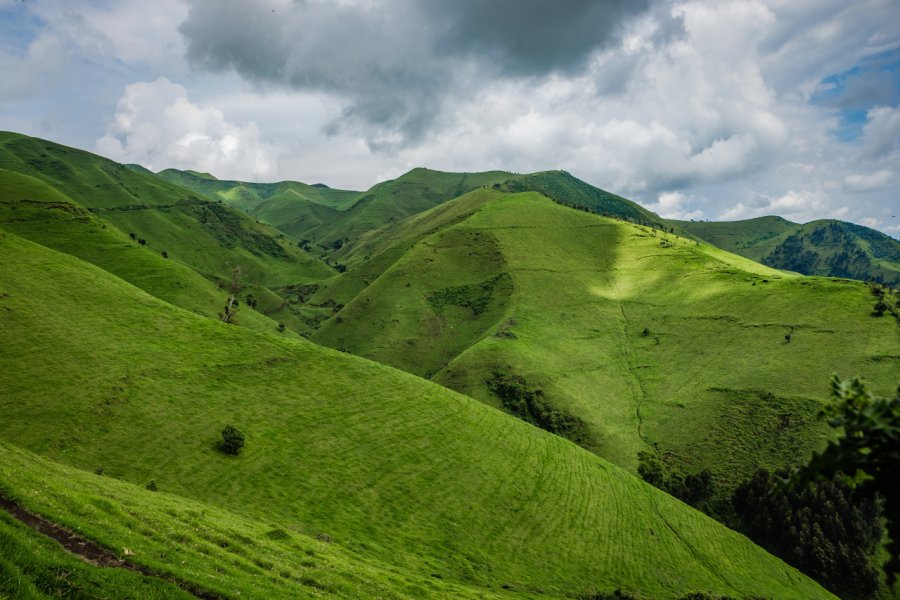Travel guide Democratic Republic Of The Congo
The Congo Basin has been a source of fascination since ancient times. Long before its discovery in the 15th century, writers such as Ptolemy, Pliny the Elder and Aristotle evoked its mysteries, from Pygmies to okapis. Later, the Congo became the scene of high-profile expeditions, leading to the creation of the independent state of Congo under Leopold II. The legendary meeting between Stanley and Livingstone, the colonial epic and Conrad's novel Heart of Darkness reinforced this myth.
The DRC, immense and rich, is superlative: the 11th largest country, crossed by the colossal Congo River, and endowed with precious mineral resources. Biodiversity takes pride of place, with its tropical forests and national parks classified as World Heritage.
Culturally, the country is a kaleidoscope of ethnic groups and languages. The fauna is exceptional, with okapi, bonobo and gorilla among others.
Despite its treasures, the real jewel in the DRC's crown is its people, warm and welcoming, preaching hospitality. Despite security challenges, the DRC is gradually opening up to tourism, hoping to revive its past as a prized destination. Provided the Congolese seize this opportunity, the "rebirth of the giant" could well be on the horizon.
It's a land that sings, dances and marvels with its striking contrasts and unsuspected wealth. Forget everything you thought you knew about Africa, as the Democratic Republic of Congo reveals its innermost secrets.
Start your journey in Kinshasa, the bustling city where the streets pulsate with life, bustling markets and warm smiles.
But don't forget to escape to the majestic nature of the Congo. The Virunga National Park, a veritable showcase of biodiversity, invites you to an emotional encounter with its imposing mountain gorillas. Here, in the serenity of the mountains, time seems to stand still. On the other side, the gentle melody of Zongo Falls will charm you.
On the palate, prepare for a feast! The generous and tasty Congolese cuisine will leave its mark on your taste buds, and you'll be able to discover it in local restaurants: tasty moambe with fragrant fish liboké! Our R. D. du Congo is your ideal companion for this destination. You'll find the best accommodations. Explore the colonial heritage of Lubumbashi, the mineral wonders of Katanga. Embark on this unique quest and let the R. D. du Congo bewitch you.
What to see, what to do Democratic Republic Of The Congo?
-
Book an activity
-
Customized travel
- The most beautiful cities Democratic Republic Of The Congo
When to go Democratic Republic Of The Congo ?
The question "When to go to the DRC?" requires a number of factors to be taken into account. The country lies on either side of the equator, giving it an equatorial climate in some regions, while others have more temperate climates. Two main seasons define the climatic landscape: the dry season and the rainy season.
January to May marks the rainy season in most of the country. This period is less ideal for some road trips due to muddy roads, but it's when nature is at its most lush and verdant. If you travel to the DRC in April, you'll witness the splendor of the tropical forests in full bloom!
June to September is the best time to visit the DRC, as the climate is milder and travel easier. During these months, prices are slightly higher due to the high tourist season. It's also a good time to explore national parks, such as the famous Virunga National Park.
October to December sees the return of the rains in some regions. However, this is also the period when local cultural events, such as traditional festivals, come to life. Passionate about culture? This is the perfect time for you.
As far as prices are concerned, the low season (the rainy season) reveals more affordable rates, while the high season sees a slight increase in prices.
When to go to the DRC depends on your personal aspirations. However, the best time to visit the Democratic Republic of Congo is from June to September, for the best possible travel experience. Don't forget to take with you your sense of adventure and your respect for this rich and diverse nation.
Suggested addresses Democratic Republic Of The Congo
Travel Democratic Republic Of The Congo
-
Find a hotel
-
Car Rental
-
International e-SIM package
-
Find a local agency
La RDC a une population à l'hospitalité légendaire. Les gens sont disposées à parler aux visiteurs.
Quand on ajoute à cela un climat où la température annuelle se situe entre 18° et 35°C, il fait bon vivre. Le paysage au bord du majestueux fleuve Congo long de 4670km et ses grands affluents ainsi que ses lacs offrent un paysage magnifique qui vous transporte dans un état de paix intérieur.
Le Congolais vit avec de la musique en permanence. La musique moderne (rumba, ndombolo, hip hop) se mélangent aux rythmes traditionnels pour produire une symbiose que vous entendrez partout, dans des bars, lieux de culte, marché, maison, etc. Chaque quartier ou village congolais a ses musiciens.
La peinture, la sculpture, l'art oratoire, la littérature, la cuisine, la photographie sont autant des productions que la visite d'un musée, d'un atelier, d'une rencontre ou d'un coup d'œil sur un bus vous emmèneront dans les méandres de la culture congolaise.
Find unique Stay Offers with our Partners
How to go Democratic Republic Of The Congo
How to go alone
Going alone in the Democratic Republic of Congo offers a unique immersion in an environment rich in culture and scenery. However, it requires adequate preparation. Find out which regions to visit and which to avoid because of their instability. Remember to take out appropriate travel insurance, bearing in mind health risks. While you're there, respect local customs and establish ties with the locals, who are often warm and welcoming. Learning a few phrases in Lingala or Swahili makes communication easier. Finally, to be on the safe side, keep a copy of your documents with you, and avoid travelling at night. A solo adventure in the DRC is an unforgettable journey, but caution is advised.
How to go on a tour
Organized travel to the Congo is a practical option. Choose the type of turnkey tour that suits you best, and check the accreditation of the travel agencies you're looking at to ensure a quality experience. Then check what's included in the price (accommodation, meals, tours, guides) and what's not (tips, personal expenses, extra activities).
Make sure you have all the necessary documents for your trip, such as passport, visa and travel insurance. Once you've booked, prepare everything you'll need for your trip. This includes checking vaccinations, packing appropriate clothing and familiarizing yourself with the local culture and customs. Finally, enjoy the trip!
How to get around
Getting around in the Democratic Republic of Congo remains atypical. Major cities such as Kinshasa and Lubumbashi are served by local cabs, an inexpensive but sometimes congested solution. For longer distances, internal flights are recommended due to the state of the roads and the vastness of the territory. Boats are popular for cruising along the Congo River, offering a unique panorama of river life. If you choose to travel by road, it's best to hire an all-terrain vehicle with a local driver . As the road network is limited and often in poor condition, good planning is essential for any journey.
Featured articles Democratic Republic Of The Congo
Discover Democratic Republic Of The Congo
An immense country in the heart of Central Africa, essentially made up of water, forests and mineral wealth as diverse as it is abundant. It's a mythical land and a veritable open-air treasure chest, which is something it has rarely been able to achieve in the past. But this is also what makes it one of the most atypical countries in the world. A form of excess, bordering on the rational, that commands admiration for a population so vulnerable yet so resilient.
In terms of tourism, DR Congo's exceptional diversity makes it a diamond in the rough. Diversity of cultures and languages. Diversity of landscapes and natural heritage: a mythical river, deep forests, savannahs, mountains, an active volcano, lakes and rivers and all this exceptional flora and fauna. All of it, or almost all of it, still in its raw state! Even if this incredible heritage, the heritage of humanity as a whole, is under threat.
Pictures and images Democratic Republic Of The Congo
The 12 keywords Democratic Republic Of The Congo
1. Ancestors
In ancestral spirituality, the living invoke the ancestors who interfere with the protective spirits to protect their descendants. The spiritual world is very much a part of Congolese life. Christians and Muslims alike are in this frame of mind, and the names of God and the Devil are commonplace in their discourse.
2. Article 15
It is said that a politician told the people in 1960 that article 15 stipulated: "You must manage to live". Of course, in the Constitution, article 15 is as imaginary as the snow in Kasai, but it sums up the Congolese people's ability to resist the harshness of daily life by finding solutions every time.
3. Djalelo
Dia leelu, now djalelo, is a word from the Kiluba language. It literally means "of today". It entered the Congolese vocabulary to mean "to praise and flatter someone". The word was made famous by a song in praise of Mobutu, who at the time behaved like Mulopwe, the great chief.
4. Eye law

The witness to a financial transaction demands the right of the eye (or right to listen). The person who collected the money gives a gratuity to the person who witnessed the transaction, simply because his eye saw the money circulating. This is a widespread practice. The proverb says: where game is skinned, everyone is entitled to a piece.
5. Endemic

A term used to describe species specific to a given territory. The DRC is home to a wealth of rare or unique plant and animal species. The country ranks among the world's top 10 countries in terms of biodiversity. Bonobos, lowland gorillas, okapis, Congo peacocks, as well as plant species.
6. Excellence
Or "Honorable". Titles as pompous as they are meaningless, attributed to ministers and deputies. Especially when we know that many of them are not exactly benchmarks for good management. By extension, some people also use it for anyone holding a high executive office: governor, burgomaster, boss...
7. Youth
In the DRC, we are struck by the youth of the population. A population with the initiative to create and innovate in all areas of life. Tens of millions of young people attend school and university. Unfortunately, the training of these young people remains insufficient to allow them to express their power.
8. Mboka
This Lingala term means country or agglomeration. Many expressions incorporate the term mboka. The Congolese are the first to be amazed, for good or ill, by their own way of being. This is how they exclaim terms like Mbok'elengi (succulent country), Oyo mboka te (It is not a country), mbok'ekufa (fucked up country).
9. Mundele
Mundele in Lingala and Muzungu in Swahili refer to the white man, the Westerner. Although neither pejorative nor contemptuous, this term is used constantly throughout the country and can sometimes be irritating, as it refers to difference. When buying or negotiating, Mundele often enjoy a preferential, slightly higher price.
10. Potential

As well as being the headline of the most widely read daily newspaper in Kinshasa, the Congolese love to talk about their country's exceptional tourist potential and the countless natural resources it has to offer. But to ensure the conversion between potential and reality, it's essential to activate the political will and commitment of each and every one of us.
11. Rumba
Congolese rumba developed from Cuban influences as early as the 1950s, and continues to evolve today to its more jerky variant, ndombolo. Music and dance accompany the daily lives of Congolese of all ages. Modern Congolese music, characterized by rumba and ndombolo, is exported throughout Africa.
12. Unit

The Congolese people hold national unity dearer than anything else, despite the many external attempts at balkanization. This feeling is reinforced by the dramatic ordeals they have long been living through. The 4 national languages (Lingala, Kikongo, Kiswahili, Tshiluba) and the Congo River consolidate the link between the different peoples of the DRC.
You are from here, if...
If you know that on the road, all lanes are fast and slow lanes, and that overtaking is done from the left as well as the right.
If you accept to be stopped by a "roulage" (traffic policeman) without having committed the slightest infraction. If you remain calm, polite and willing to sacrifice a few bucks.
When you understand and accept that a trivial problem can become insoluble as soon as a well-meaning person offers to help you solve it.
If you don't find it unusual that your 10 a.m. appointment calls you at 11.30 a.m. to "locate" you and suggest we meet elsewhere tomorrow at 2 p.m..
If you refuse a $10 bill with a micro-tear in it, and accept Congolese francs that have become illegible and infected by bacteria thousands of years old.
If you accept that in a church, a bar or on the street, someone can play loud music or speak in a loud voice. In big cities, absolute silence is suspect.

